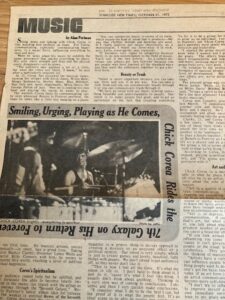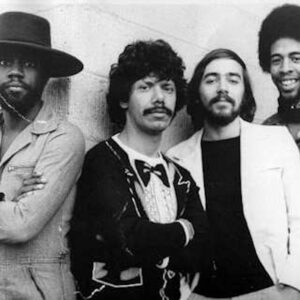Chick Corea Interview, 50 Years Later
 As promised, here is the digitalized version of the article I wrote on Chick Corea for the Syracuse New Times in 1973. My first published article. I see some flaws but, overall, not bad.
As promised, here is the digitalized version of the article I wrote on Chick Corea for the Syracuse New Times in 1973. My first published article. I see some flaws but, overall, not bad.
Smiling, Urging, Playing as He Comes, Chick Corea Rides the 7th Galaxy on His Return to Forever
Syracuse New Times, October 21, 1973
By Alan Perlman
Sitting down and talking with Chick Corea is like watching him perform on stage. For Corea, communicating, especially communicating happiness, is a major force, influencing everything he says and does.
When he talks about his music he exhibits the same assurance that marks everything he plays. His eyes stare straight and deep and the pixyish smile disappears—yet he glows.
“The audience may applaud a lot or a little, but when the vibes are there I know,” he said after a particularly inspired set.
At 32, Corea has ascended the musical ranks, earning his stripes with Elvin Jones, Willie Bobo, Mongo Santamaria, Herbie Mann, Blue Mitchell, Stan Getz and, most importantly, Miles Davis, the George Patton of jazz. Now he is leading his own band and playing the music he wants to play. Read more



